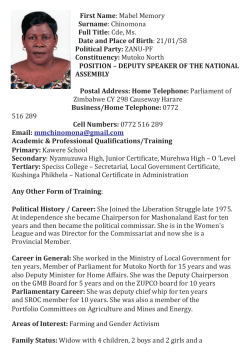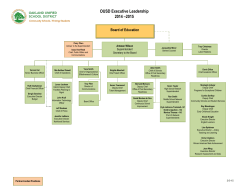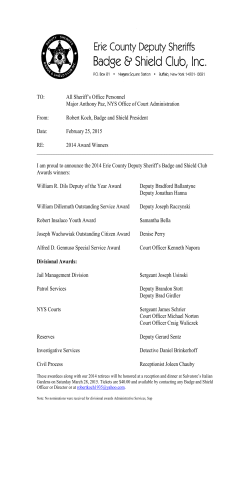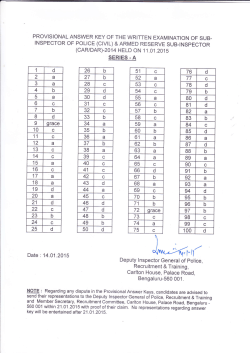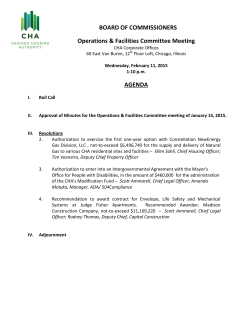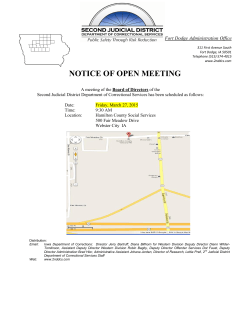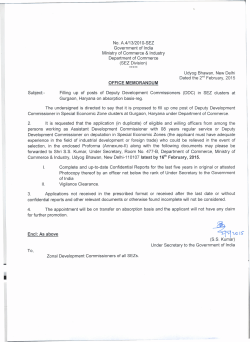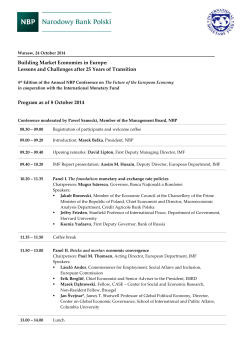
Supplementary Agenda - Barkly Shire Council
VISION We are a progressive and sustainable Council who respects and listens to the people. The Way We Will Work We will be engaged and have regular opportunities to listen. We will have strong policy and budgets to ensure our programs and services are progressive and sustainable. Respect is shown in everything we do and we have acceptance of all cultures in the Barkly Region and their practices. We are a responsible Council that meets all of its regulatory and social responsibilities. We will be a responsive Council. SUPPLEMENTARY AGENDA ORDINARY COUNCIL MEETING MONDAY, 13 APRIL 2015 TENNANT CREEK The Ordinary Council Meeting of the Barkly Regional Council will be held in Tennant Creek on Monday, 13 April 2015 at 9:30am. Edwina Marks Chief Executive Officer -1- AGENDA ITEM 9 SUBJECT PAGE NO GENERAL BUSINESS AND MATTERS FOR NOTING REPORTS 9.11 Role of Deputy President .................................................................................................. 3 -2- Supplementary Agenda - Ordinary Council Meeting 13 April 2015 GENERAL BUSINESS AND MATTERS FOR NOTING ITEM NUMBER TITLE REFERENCE 9.11 Role of Deputy President 137450 AUTHOR Courtney Barber, Executive Assistant to the CEO RECOMMENDATION That Council a) Receive and note the report b) Adopt the procedure for all Deputy President appointments SUMMARY: The report outlines the procedure for the role of the Deputy President BACKGROUND The role of the Deputy president. When we are considering the role of the Deputy President, we need to consider what the Act does (or does not say) about the role of the President. From the legislative perspective, the Local Government Act 2008 (No 12 Of 2008), Sect 43 outlines the Role of principal member (and Deputy or acting principal member). However, the roles and responsibilities of the Deputy are not specifically defined and need to be determined by Council. Importantly, whenever the President is on leave, the Deputy (or any other Councillor) must be appointed to this Acting Presidential role by the rest of the Council. The details of the legislation are outlined below and additional roles and responsibilities suggested by Council are outlined at the end of this paper. Role of the Principal Member Sect 43 outlines the Role of principal member (and Deputy or acting principal member). This is as follows: 1. The role of the principal member of a council is: a. to chair meetings of the council; and b. to speak on behalf of the council as the council's principal representative; and c. to carry out the civic and ceremonial functions of the principal member. 2. The role of the Deputy principal member of a council is to carry out any of the principal member's functions when the principal member: a. delegates the functions to the Deputy; or b. is absent from official duties because of illness or for some other pressing reason; or c. is on leave. 3. If the principal member is absent from official duties on leave or for some other reason, and there is no Deputy principal member or the Deputy is not available to act in the principal member's position, the council may, by resolution, appoint some other member of the council to act in the principal member's position for a specified period or until the principal member resumes official duties. Appointment The key understanding here about the role of the Deputy President is that it is an appointed position by Council. Accordingly, the Local Government Act does not prescribe a role other than its reference in the legislation above. For Councils that have a Deputy President, a Deputy President is not able to automatically step into the role of President if this becomes necessary. An acting President must be appointed when the role is required and this does not have to be the Deputy President. Once -3- Supplementary Agenda - Ordinary Council Meeting 13 April 2015 appointed the role is to provide active support on behalf of Council and to carry out the civic and ceremonial functions of the principal member. SECT 45 Appointment or election of principal member (and Deputy) 1. If appointment is the basis of filling the office of the principal member of a council, the council must, at the first meeting of a council to be held after a general election, appoint one of its members to be the principal member, and another to be Deputy principal member, of the council. 2. If election is the basis of filling the office of the principal member: a. the office is to be filled at each general election; and b. the council must, at the first meeting of the council to be held after each general election, appoint one of its members to be Deputy principal member. Roles and responsibilities The role and office of the President is a demanding one, with unlimited access 7 days a week, across a very large region. The logistically impossibility of achieving 100% attendance at all invited events and meetings often presents a barrier to the Councils engagement. As a result, all Councillors work together as a team to be available for civic engagement in their local areas and for key Tennant Creek events such as Australia Day, Territory Day and major events of the Territory Government. Additionally, the role of the Deputy President has been voted as the key Councillor position to assist in the carrying out of the duties of the Presidential Office. Therefore, once appointed, each Deputy President is expected to assume the following responsibilities when they take office. Attend Local Authority meetings across the region within the term as agreed with the President Share civic duties across the region during the period Attend meetings on behalf of the President when required Liaise and connect with other Councillors to assist with Council decision making and information gathering in conjunction with the President Assist with advice in relation to Councillor portfolios and Councillor issues Assist in the day to day tasks of the Presidential office to maximise engagement opportunities Assist the President in relation to civic and ceremonial duties where required eg. Citizenship ceremonies Other responsibilities as agreed Critical Engagement The above outline is expected to assist and inform Councillors in their understanding of this key role and its importance in assisting the President to strategically maximise the engagement of Council during their term. ISSUE/OPTIONS/CONSEQUENCES Nil CONSULTATION & TIMING Nil ATTACHMENTS: There are no attachments for this report. -4-
© Copyright 2026
